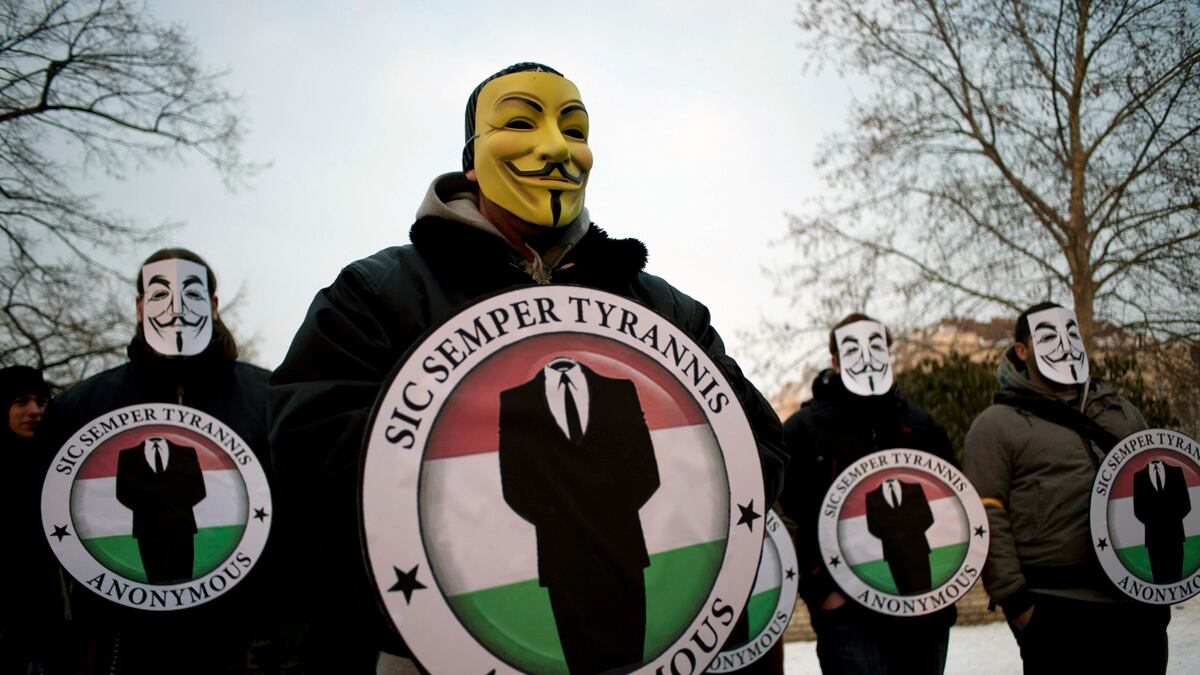In Tuesday's GoDaddy service disruption, the media storm started with a tweet from an Anonymous-affiliated Twitter user named Anonymous Own3r. "I'm taking godaddy down bacause well i'd like to testhow the cyber security is safe and for more reasons that i can not talk now,” Own3r ungrammatically tweeted. Own3r’s Twitter description jokingly says he's an "Official member" of Anonymous, knowing such a declaration to be meaningless. But that was enough for most media organizations to run with the story.
On Tuesday, however, the web-hosting juggernaut declared that its service disruption was caused by “internal network events,” and not some rogue hacker after all. The outlets that ran Own3r’s story ended up with pie on their faces. Whoever threw it, they’ll never know…Anonymous. But the episode is emblematic of the media’s credulity on Anonymous, their inability to comprehend an entity like this curious collective, and more damningly, shows how the current structure of our media prioritizes speed over accuracy.
Anonymous Own3r’s tweet was passed around various self-described Anonymous members' Twitter accounts, and soon was picked up by tech media, followed by mainstream news outlets, national TV and radio, and eventually, newspapers with global reach. Own3r later posted some code he claimed was scraped from GoDaddy, but that same code had been pasted to a forum more than two years ago.
It’s an old game. Just last week, a few Anonymous members leaked a million Apple ID numbers they claim had been gleaned from an FBI agent's laptop. The following day? Nope.
Throughout the fall of 2011, several Anonymous affiliates waged a one-sided PR war against a multi-billion-dollar Mexican drug cartel. One video claimed a member had been kidnapped by the Zetas cartel while pamphleteering, and threatened to expose cartel collaborators by publishing their photos and contact information. Later, one Anon affiliate and oft-interviewed "spokesman" for the group (who insists he's not a spokesman while constantly speaking for Anonymous) claimed the gang had capitulated, and released their captured comrade. No evidence was ever offered to verify this claim, or that the kidnapping ever took place.
The collective also claimed they would "erase" the New York Stock Exchange and "kill" Facebook. Of course, neither of these attacks materialized, but both threats were widely reported by tech and mainstream news media alike.
Anonymous’s greatest strength is not their storied network-infiltration acumen, but their knack for “hacking” the media, manipulating the page view-hungry online media cycle by performing outrageous stunts, or even just merely threatening big attacks.
Since Anonymous actually does pull off legitimate hacks on occasion, journalists are tripping over themselves to break them. That's why they're willing to publish a dozen “equivocating stories peppered with "allegedly” for every confirmed hack that comes down the pike.

Such treatment of this shadowy collective—an entity with no official leadership, manifesto, or goals—is widespread within the media. If a threat turns out to be impotent, no one at the news desk looks bad, because a follow-up piece that could have been a simple retraction is considered an opportunity to extend the story.
Since there are nearly as many goals within Anonymous as there are members, it's difficult to codify what they're about. They comprise politically-minded charlatans, clueless cheerleaders, malicious child predators, and yes, actual hackers. Some of them just want to harass ’tweens; others want to fight for freedom of speech in the Middle East.
Anonymous isn't so much a group as a brand. Like Occupy, it means different things to different people. But if one had to pick a single thread running through the group's multi-faceted history, it'd be the urge to troll; to derive joy through disturbing the equilibrium of another's emotional state. To annoy, enrage or confuse.
How can such an amorphous and willfully antagonistic non-group, made up of people who have no way of demonstrating either their clout within Anonymous or their hacking ability, ever be trusted to provide a journalist with anything on which to build a story? They can't, but that won't stop us from trying.
I wouldn't be much of a journalist in 2012 without a salvo of Google hitting my inbox every time a news organization writes about the subject matter I cover. For me, that’s Anonymous. I follow the “Anonymous” keyword on Google to track the day-to-day activities of the nebulous collective of Internet trolls and so-called “hacktivists.”
One can learn a lot about a given subject by tracking it via Google Alerts, but one can learn more about how news spreads on the Web—stories bubble up from message boards and social networks, growing increasingly sensationalized as they bloom into fear-mongering nightly news exposes and features in the local paper. Throughout the course of a day one can observe which sites are essentially copy-pasting content from others, and how lies and misconceptions spread throughout a story's coverage from publication to publication. Without any hacking ability at all, the creators of these deceptions sit back and watch, as their boasts propagate throughout the public discourse, like a virus infecting a computer network.
The barely literate random dude on Twitter known as Anonymous Own3r may not have owned GoDaddy, but his eventual prize far outweighed such a victory. He hacked the global media, and all he had to do was cry wolf.






